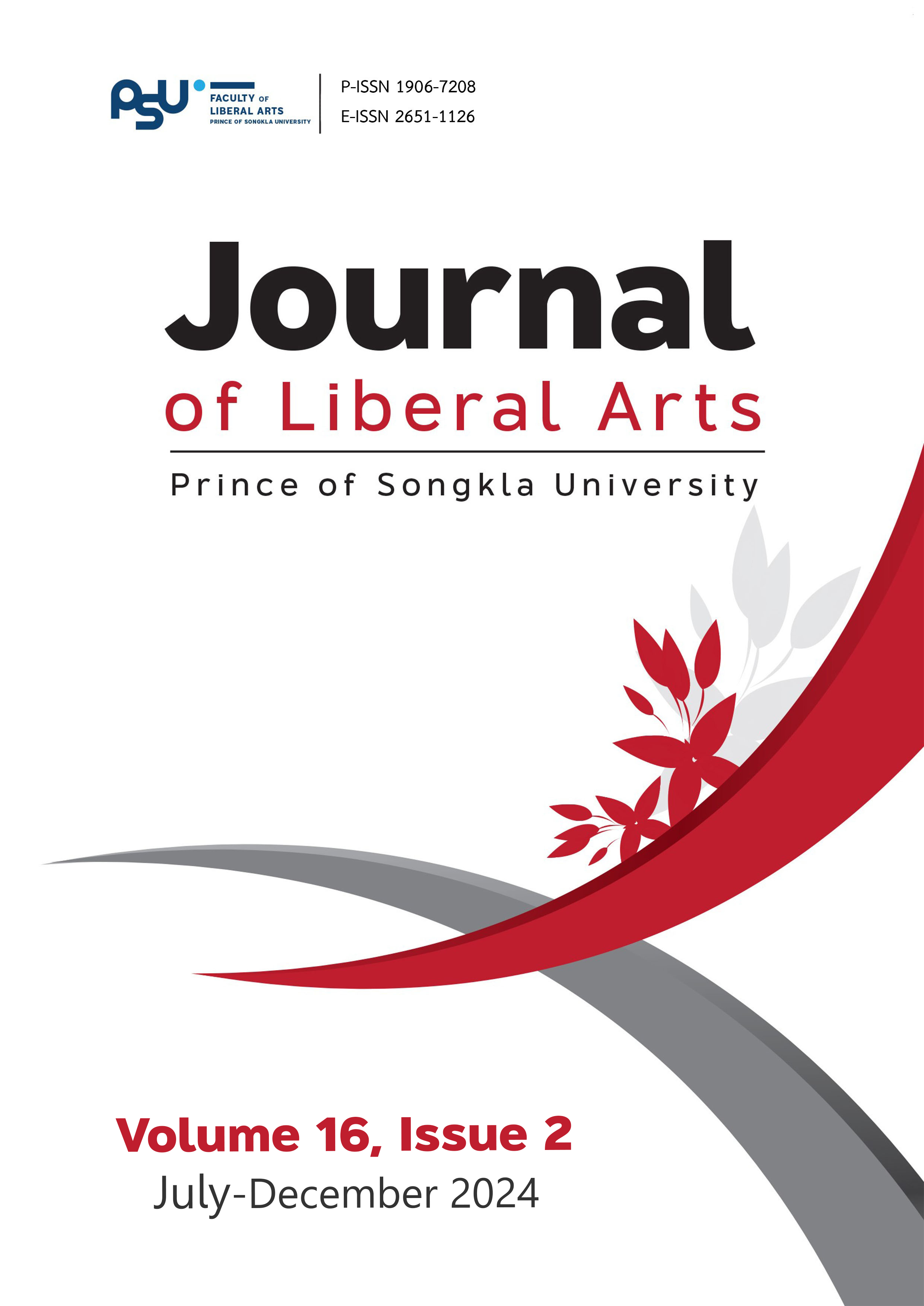The Use of Home-Based English Language Activities to Enhance Thai Parents’ Involvement in their Children’s English Learning: A Study of Thai Parents with Limited English Proficiency
DOI:
https://doi.org/10.14456/jlapsu.2024.16Keywords:
Thai Parents, Limited English Proficiency Parents, Home-Based English Language Activities, Parental Involvement, English As A Foreign LanguageAbstract
Parental involvement in promoting learning at home plays a crucial role in the English development of children learning English as a foreign language (EFL). However, parents with limited English proficiency (LEP) often face difficulties supporting their children, which may reduce their children’s opportunities to improve their English. This study aimed to enhance the involvement of Thai LEP parents in supporting their children’s English language learning at home through the use of home-based English language activities (HELAs). A mixed-methods design was utilized, incorporating a one-group pre-test and post-test approach. The participants, selected through purposive sampling, were 26 Thai LEP parents whose children were attending a preschool in northern Thailand. The research instruments consisted of four HELAs: using fable videos, using vocabulary teaching videos, using picture cards, and reading books with children. Additionally, pre- and post-questionnaires and semi-structured interviews were used to measure changes in parental involvement across three mechanisms: implicit instruction, encouragement, and reinforcement. The findings revealed significant increases in parental involvement. Two critical factors contributing to this improvement were identified: First, HELA participation raised parents’ awareness of the importance of their involvement and boosted their self-efficacy. Second, the practical design of the HELAs facilitated involvement for LEP parents. However, reading activities posed a significant challenge for some parents. This study offers valuable insights for using HELAs to better support LEP parents in facilitating their children’s English learning at home.
References
Alkharusi, H. (2022). A descriptive analysis and interpretation of data from Likert scales in educational and psychological research. Indian Journal of Psychology and Education, 12(2), 13-16.
Beck, I. L., McKeown, M. G., & Kucan, L. (2013). Bringing words to life: Robust vocabulary instruction. Guilford Press.
Branch, R. M. (2009). Instructional design: The ADDIE approach. Springer.
Choi, N., Kang, S., Cho, H. J., & Sheo, J. (2019). Promoting young children’s interest in learning English in EFL context: The role of mothers. Education Sciences, 9(1), 46. https://doi.org/10.3390/educsci9010046
Clément, R., & Baker, S. C. (2001). Measuring social aspects of L2 acquisition and use: Scale characteristics and administration. University of Ottawa.
Forey, G., Besser, S., & Sampson, N. (2016). Parental involvement in foreign language learning: The case of Hong Kong. Journal of Early Childhood Literacy, 16(3), 383-413. https://doi.org/10.1177/1468798415597469
Green, C. L., Walker, J. M., Hoover-Dempsey, K. V., & Sandler, H. M. (2007). Parents’ motivations for involvement in children’s education: An empirical test of a theoretical model of parental involvement. Journal of educational psychology, 99(3), 532. https://doi.org/10.1037/0022-0663.99.3.532
Hoover-Dempsey, K. V., & Sandler, H. M. (2005). Final performance report for OERI Grant# R305T010673: The social context of parental involvement: A path to enhanced achievement. http://hdl.handle.net/1803/7595
Hoover-Dempsey, K. V., Walker, J. M., Sandler, H. M., Whetsel, D., Green, C. L., Wilkins, A. S., & Closson, K. (2005). Why do parents become involved? Research findings and implications. The elementary school journal, 106(2), 105-130.
Huang, S. (2013). The use of literacy bags promotes parental involvement in Chinese children’s literacy learning in the English language. Language Teaching Research, 17(2), 251-268. https://doi.org/10.1177/136216881347595
Khamsuk, A., & Whanchit, W. (2021). Storytelling: An alternative home delivery of English vocabulary for preschoolers during COVID-19’s lockdown in southern Thailand. South African Journal of Childhood Education, 11(1), 1-13.
Lai, J., Ji, X. R., Joshi, R. M., & Zhao, J. (2024). Investigating parental beliefs and home literacy environment on Chinese kindergarteners’ English literacy and language skills. Early Childhood Education Journal, 52(1), 113-126. https://doi.org/10.1007/s10643022-01413-3
Lau, C., & Richards, B. (2021). Home literacy environment and children’s English language and literacy skills in Hong Kong. Frontiers in Psychology, 11, 569581. https://doi.org/10.3389/fpsyg.2020.569581
Lee, Y. (2010). Parents’ perceived roles and home practices in supporting Taiwanese children’s English language and literacy learning. English Teaching & Learning, 34(1), 1-53.
Liu, C. C., & Chung, K. K. H. (2023). Impacts of home literacy environment on children’s English language learning as a second language. European Journal of Psychology of Education, 39. 1421–1439. https://doi.org/10.1007/s10212-023-00745-x
Petchprasert, A. (2014). The Influence of Parents’ Backgrounds, Beliefs about English Learning, and a Dialogic Reading Program on Thai Kindergarteners’ English Lexical Development. English Language Teaching, 7(3), 50-62.
Tong, F., Zhang, H., Zhen, F., Irby, B. J., & Lara-Alecio, R. (2021). Supporting home literacy practices in promoting Chinese parents’ engagement in their children’s English education in low-SES families: an experimental study. International Journal of Educational Research, 109, https://doi.org/10.1016/j.ijer.2021.101816
Walker, J. M., Shenker, S. S., & Hoover-Dempsey, K. V. (2010). Why do parents become involved in their children’s education? Implications for school counselors. Professional school counseling, 14(1). https://doi.org/10.1177/2156759X1001400104
Webb, S., & Nation, P. (2017). How vocabulary is learned. Oxford University Press.
Whitaker, M.C. (2019). The Hoover-Dempsey and Sandler model of the parent involvement process. In S. Sheldon and T. Turner-Vorbeck (Eds.), The Wiley handbook of family, school, and community relationships in education (pp. 421-433). Hoboken, NJ: Wiley Press. https://doi.org/10.1002/9781119083054.ch20
Yeung, S. S., & King, R. B. (2016). Home literacy environment and English language and literacy skills among Chinese young children who learn English as a second language. Reading Psychology, 37(1), 92-120. https://doi.org/10.1080/02702711.2015.1009591
Zhang, X., Lau, C., & Su, Y. (2021). Home environment and development of English as a second/foreign language for young children in Asian contexts: A systematic review and meta-analysis. Early Education and Development, 34(1), 274-305. https://doi.org/10.1080/10409289.2021.1981065
Downloads
Published
How to Cite
Issue
Section
License
Copyright (c) 2024 Poowadol Srimalee, Songsavan Worraarpakorn

This work is licensed under a Creative Commons Attribution-NonCommercial-NoDerivatives 4.0 International License.
The authors retain the copyright to their article but the Journal of Liberal Arts, Prince of Songkla University reserves the exclusive rights to first publication.






